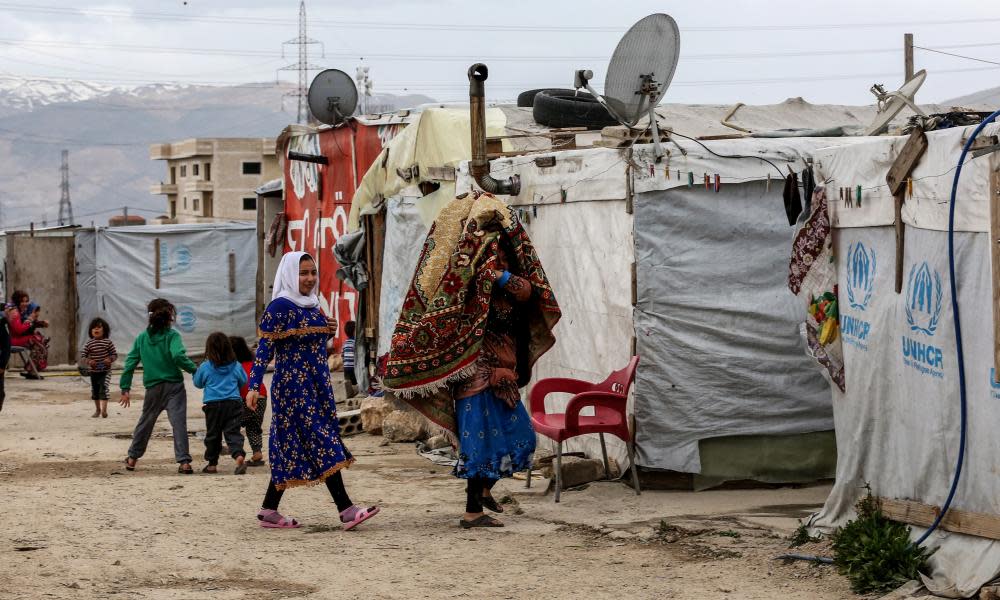Fears realised as first Covid-19 case found in Lebanon refugee camp

Medics are scrambling to contain a potential outbreak of Covid-19 in a Palestinian camp in Lebanon after a refugee tested positive for the virus, the first known case in one of the region’s most vulnerable communities.
The patient, a woman in her 40s, is being treated at a state-run hospital in Beirut. A medical team travelled to the al-Jalil camp in Lebanon’s Bekaa valley on Tuesday to screen the women’s relatives and anyone else who had come into contact with her.
The UN and authorities in the region had seen such an outcome as almost inevitable. It prompted fresh calls to protect refugees from the pandemic, which could be devastating if it took root among the cramped and often unhygienic confines of refugee camps.
“We knew it was a matter of time before we had a case confirmed in the Palestine refugee community, and that’s what happened,” said Tamara al-Rifai, spokesperson for the United Nations Relief and Works Agency (UNRWA). “Our position is that everyone who needs medical treatment for Covid-19 should get it, with no discrimination. UNRWA will cover the cost of the treatment of the confirmed case, and will support her family if they need to isolate themselves.”
The rampant spread of coronavirus through developed nations, with advanced health systems, has caused deep alarm in Lebanon, Syria, Iraq, Turkey and Jordan, where more than 12 million refugees, or internally displaced people, have little access to life-saving health care and cannot practise physical distancing.
default
In a separate development, coronavirus is confirmed to have killed a patient in a hospital in north-eastern Syria two weeks ago, the first of its kind in another regional conflict zone. The NGO Médecins Sans Frontières said the diagnosis cast a spotlight on the area’s capacity to deal with the pandemic. “The response in north-east Syria at this time is not nearly enough,” Crystal van Leeuwen, MSF’s medical emergency manager for Syria, said. “A significant increase in assistance from health actors, humanitarian organisations and donors is essential.”
As fears grow that refugees will bear the brunt of the next wave of coronavirus, the UN High Commissioner for Refugees (UNHCR) has increased demands for them to be protected by unholding human rights laws.
Related: US to give Palestinians $5m in coronavirus aid – 1% of what Trump cut
Its head, Filippo Grandi, said: “The core principles of refugee protection are being put to test, but people who are forced to flee conflict and persecution should not be denied safety and protection on the pretext, or even as a side-effect, of responding to the virus.
“Securing public health and protecting refugees are not mutually exclusive. This is not a dilemma. We have to do both. Long-recognised refugee laws can be respected even as governments adopt stringent measures to protect public health, including at borders.”
Regional states’ commitment to refugee protection is being increasingly challenged, with many concerned about the strains on their already weakened economies. In Lebanon, Palestinians are routinely denied access to state care.
The United Nations Relief and Works Agency for Palestine refugees (UNRWA), which has struggled since the Trump administration withdrew funding in 2018, has raised $14m (£11.3m) for its initial Covid-19 response. With much of that money now spent, and fears of infections being realised, UNRWA leaders are launching a second funding appeal.
A total of 9,400 refugees are registered at Lebanon’s al-Jalil camp but the real population remains unknown, and could be as low as 3,000. Waves of departures to Gulf states, and undocumented arrivals from Syria over the past nine years, have made actual numbers of refugees in Lebanon, and their whereabouts, difficult to discern.
Lebanon hosts around 475,000 Palestinian refugees in 12 camps and 26 unofficial sites. They are among the most impoverished people in the country, which is also believed to have up to 1 million Syrian refugees. Many of the Syrians are living in informal settlements, which are even harder for health authorities to regulate.

